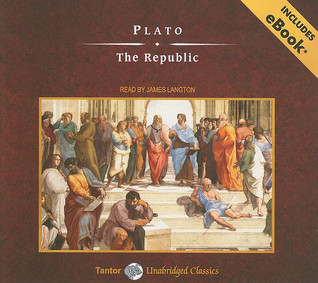5 of 5 stars *****
The second of the Hunger Games trilogy, Catching Fire, is every bit as exciting and intriguing as the first novel. As the first sets the stage for the rules of the game and the disparity in society, the second book reveals how the rules change in a struggle to maintain the social status quo. The author, Suzanne Collins, captures the humanity in the quest to stay alive while forming bonds of personal and patriotic love between combatants. This inspires the poor. Hope emerges, much to the dismay of the power that is privy to all the secrets of the poor. The classic battle between Good and Evil ensues as the poor define the true enemy opening the door for the third novel in this trilogy, Mockingjay.
4 of 5 stars ****
The audiobook version of The Republic by Plato, is a trying endeavor. The amount of mindful information Plato expresses in mere seconds couples with deep analysis spoken aloud challenging the audience to follow his train of thought. This listener jots notes as James Langton narrates with perfect diction and alternating voice inflections that denote separate characters, of whom Socrates is the major. If the audiobook continues during a jotting, essential points may elude the recorder. Interruptions occur every four to seven seconds to achieve an accurate note, which conjures thought-provoking tangents of relative information; thus, the tedious task of comprehending the author's true intent. This classic is required reading for those pursuing careers in leadership, government, politics, and philosophy. Many of the quotes in The Republic are responses by Socrates to queries looking for veracity. The dialogues cover a wide range of components in the order of the universe, our interactions with it, and with one another. Discussions of physical and abstract qualities explore the best and worst faculties and ideas to arrive at truth, the perfect state of nature. Absolutes are real for mankind to aspire deeming those who approach pure intellect and wisdom to be the most just and; therefore, rulers of the many, who fall short of truth. The majority base their beliefs and perceptions on reality's shadow, opinion. Pure intellect is science with understanding whereby opinion falls between knowledge and ignorance. To conclude, Utopia is harmony ruled by philosophers who love truth and wisdom, a virtue divine, according to Plato.
5 of 5 stars *****
Readers enjoy the true, secretive escapades of the Culper Ring who put their lives on the line to acquire pertinent information for General George Washington when New York City and Long Island are still colonies of England. It is this group of five men and one woman who give Washington an advantage over the world's most powerful army of the day. This spy ring is known today only because of the tedious investigation of a few history enthusiasts willing to spearhead the daunting task that uncovers documentation from conjecture and lore in search of truth. Brian Kilmeade and Don Yaeger are the passionate authors who acknowledge a team of others who apply their professional talents to this endeavor which makes for a most exciting read. The acknowledgements section at the end of the book is just as intriguing as the authors explain the significance of every contributor.It is rare, today, to read a non-fiction American history that is full of new information which details covert operations during the birth of this nation. George Washington's Secret Six: The Spy Ring That Saved the American Revolution educates while entertaining anyone who is fortunate to read this book.
5 out of 5 stars *****
The controversy surrounding Common Core is the subject that Glenn Beck tackles in Conform: Exposing the Truth About Schools. Control of the American school system that is driven by unions rather than children is at the heart of the controversy. Glenn explains the history and rationale behind Common Core, a set of universal standards to improve the delivery of a curriculum that each state may tweak to meet its particular needs. This homogenization sounds like a simplification, and therefore, a need-fulfilling update to a failing educational system. The author argues that actual results from Common Core's application are more foreboding than comforting. Common Core may create a nation of drones rather than free-thinking individuals. A simple approach to basic arithmetic becomes a 30-step convolution that arrives at an answer, one which is incorrect if the Common Core approach is not utilized; for example, if division of one number into another yields the same answer, it is considered incorrect. The controversy deepens with Common Core's unwritten and unspoken intention to control how children think. This opens the door for their manipulation and indoctrination into socialistic views, like the collective is more important than the individual. That and rewriting history to suit an ideology that supports European political concepts, favoring Islam while diminishing Christianity, and teaching that America's Constitutional Republic inspired by Judaeo-Christian morals is outdated. This concept of a collective challenges the role and influence that the nuclear family has on their children when implementing such an educational tool.This book explains why Common Core became so popular in the first place. The idea implies Common Core standards improve America's status in the world; so most Governors sign on before it is complete. States also receive a nice Federal check for accepting Common Core. Powerful government unions endorse the program. Bill Gates invests heavily in Common Core as his company, Microsoft, makes the software for all the curriculum. Popular politicians, like Jeb Bush, argue against Common Core resistance. Beck further explains that most people may be unaware that unions collectively bargain deals that benefit unions over children. Politicians are reluctant to go against political correctness or the powerful labor union, the National Education Association (NEA), who have the power to sway elections and influence one's political career. The NEA represents teachers, secretaries and educational support personnel, not children. All the money thrown at education bears witness to the success of collective bargains securing great deals for union administrators but no change, whatsoever, in student scores or learning abilities. If anything, government control of schools ensures a decline or maintenance of the status quo.Glenn points out how review of textbooks reveal Special Interest involvement which indoctrinates students to favor their agenda at the cost of the truth. Parents are not part of the process that introduces their children to information and processes unfamiliar to them. Less choices are available for parents who have legitimate questions about the veracity of textbook content. Instead, parents are told that educators know what is best for their children when it comes to this fundamental aspect of their lives. This book also gets into the fight against Common Core, which has tried to hide the bad publicity by changing its label, a common Progressive tactic used in other unpopular programs, like Agenda 21 becoming some Green Earth Sustainability Initiative. Beck cites Florida's attempt to hide the bad news about Common Core by relabeling it, Next Generation Sunshine State Standards. Support to fight Common Core is given to the reader with suggestions to attend: 9.12 Project Groups, which exist locally in just about every state, to coordinate and educate communities on civic and social issues; School Board and State Legislative meetings to give voice to community and individual concerns that affect children, who have no voice; and to go online to connect to Education Action Groups, which may suggest reviewing textbooks.It is vital to have private individuals with the passion to write about topics that affect all of us and future generations. Glenn Beck is such an individual who writes this professional, informative, and essential book that serves Americans in the name of freedom and liberty.
5 of 5 stars *****
What dandies this book and Dorian Gray are. Oscar Wilde's first novel reveals his opinions on women, romance, the arts, religion, and life in general through Dorian's mentors. Those original ideas are controversial for the late 1800's and still provocative for today. This story is written before women's right-to-vote and emancipation so the attitudes toward women, then, are very different than they are today.This story centers around a portraiture of a young, handsome popinjay, Dorian Gray. Its creator, Lord Basil, consumes inspiration from the mere presence of his model. Dorian makes a wish that he could look as attractive as he does during this painting and his wish comes true, but not without consequence.The story expands to romance when the naive Dorian falls hopelessly in love with a 17 year-old actress, Sibyl. Sibyl is smitten with Dorian and feels reality in a visceral way for the first time. Her performance on stage suffers greatly because of her love for Dorian, but this, too, has unforeseen consequences.The most influential friend of Dorian is Lord Harry, who sees this youthful, perfect specimen maintain aspects of charm and beauty as time elapses. Lord Harry, almost vicariously, points out Dorian's attributes as being superior to others. What the mentors of Dorian fail to realize is how his experiences with reality affect the portrait rather than the man. The Search for Beauty as the Secret of Life lesson proves to be shallow. Oscar Wilde's prose is certainly not amateur. He is quoted often and his books are classics, including, The Picture of Dorian Gray. He describes art as, "A dream of form in days of thought," in the preface; and atonement thusly, "It is the confession, not the priest, that gives us absolution."
5 of 5 stars *****
A profound and unexpected account of abstracts that are fun, touching, and revealing. Prepare to awaken visceral feelings by the mere arrangement of words spoken or read.





